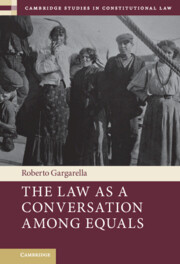Book contents
- The Law As a Conversation among Equals
- Cambridge Studies in Constitutional Law
- The Law As a Conversation among Equals
- Copyright page
- Contents
- Preface
- Acknowledgments
- 1 Constitutionalism and Democracy
- 2 The Law As Conversation among Equals
- 3 “Democratic Dissonance”
- 4 A Constitution Marked by a “Discomfort with Democracy”
- 5 Motivations and Institutions: “If Men Were Angels”
- 6 The Structural Difficulties of Representation
- 7 The Rise and Fall of Popular Control
- 8 The Periodic Vote, or “Electoral Extortion”
- 9 Checks and Balances
- 10 Presidentialism
- 11 Rights
- 12 Social Rights and the “Engine Room”
- 13 Judicial Review
- 14 Constitutional Interpretation
- 15 Constitution Making
- 16 The Birth of Dialogical Constitutionalism
- 17 Why We Care About Dialogue
- 18 “Democratic Erosion”
- 19 The New Deliberative Assemblies
- 20 Conclusion
- Bibliography
- Index
10 - Presidentialism
Busting the Checks and Balances
Published online by Cambridge University Press: 25 April 2022
- The Law As a Conversation among Equals
- Cambridge Studies in Constitutional Law
- The Law As a Conversation among Equals
- Copyright page
- Contents
- Preface
- Acknowledgments
- 1 Constitutionalism and Democracy
- 2 The Law As Conversation among Equals
- 3 “Democratic Dissonance”
- 4 A Constitution Marked by a “Discomfort with Democracy”
- 5 Motivations and Institutions: “If Men Were Angels”
- 6 The Structural Difficulties of Representation
- 7 The Rise and Fall of Popular Control
- 8 The Periodic Vote, or “Electoral Extortion”
- 9 Checks and Balances
- 10 Presidentialism
- 11 Rights
- 12 Social Rights and the “Engine Room”
- 13 Judicial Review
- 14 Constitutional Interpretation
- 15 Constitution Making
- 16 The Birth of Dialogical Constitutionalism
- 17 Why We Care About Dialogue
- 18 “Democratic Erosion”
- 19 The New Deliberative Assemblies
- 20 Conclusion
- Bibliography
- Index
Summary
The proposed constitutional organization of the political sphere, including, in a special way, the design of the executive and legislative branches, also reflected assumptions of democratic distrust. In this I explore the imbalance generated within the system of “checks and balances” by strong presidential systems and, in particular, by the presence of what some have called “hyper-presidentialism” (Nino 1997). In fact -I argue- the current system depends on finding a “President-angel” who is capable of and willing to demonstrate the qualities of her character throughout the term of her administration. When, on the contrary, the person elected President does not turn out to be up to the job, or is susceptible to pressure and influence, or takes offense at criticism from society and begins acting in an authoritarian or abusive manner, then the bare reality of the institutional system is revealed. And when this happens, we see that the system, in truth, is incapable of imposing firm control, that it allows abuse to continue, and that it is vulnerable to authoritarian manipulation. This situation -I maintain- should largely be seen as an endogenous product of the institutional system, much more than the result of personal pathologies (authoritarian leaders or unenlightened representatives).
Keywords
- Type
- Chapter
- Information
- The Law As a Conversation among Equals , pp. 136 - 148Publisher: Cambridge University PressPrint publication year: 2022

